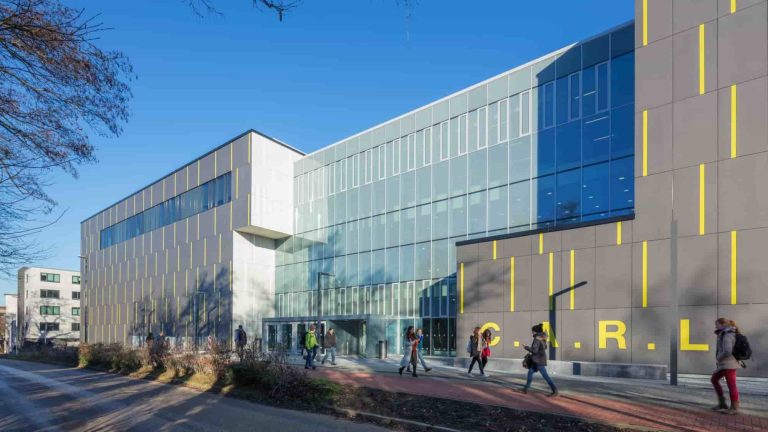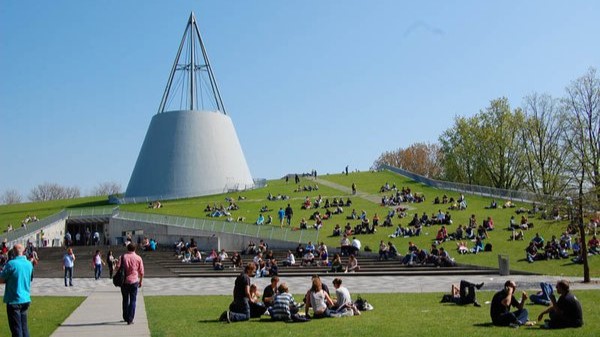

AUTOMOTIVE ENGINEERING
World-Class Education: European universities such as Technische Universität München (Germany), Polytechnic University of Turin (Italy), and KTH Royal Institute of Technology (Sweden) offer highly regarded Automotive Engineering programs, recognized for their academic excellence and cutting-edge research.
Comprehensive Curriculum: Students engage in an interdisciplinary education that covers mechanical, electrical, electronic, and software engineering, focusing on vehicle design, manufacturing processes, and the operation of motorcycles, automobiles, and trucks.
Hands-on Training: Programs provide practical training, allowing students to design automotive systems, analyze data, conduct experiments, and develop solutions to real-world engineering challenges.
Global Career Opportunities: Graduates gain skills that are in demand by global automotive giants like BMW, Mercedes, and Volkswagen, ensuring diverse career paths in design, manufacturing, and research.
International Exposure: Indian students benefit from studying in a multicultural environment, accessing valuable internships and networking opportunities, which enhance both their career prospects and personal development.
Research and Innovation: European universities are at the forefront of automotive innovation, giving students the chance to contribute to projects related to electric vehicles, autonomous driving, and sustainable transportation technologies.

CIVIL ENGINEERING
Advanced Specialization: The four-semester Master's program in Civil Engineering at top European universities like ETH Zurich (Switzerland), Delft University of Technology (Netherlands), and Politecnico di Milano (Italy) allows students to specialize in areas such as structural engineering, environmental engineering, and transportation systems.
Leadership and Management Skills: Students are prepared for leadership roles, whether in large companies or their own construction firms, gaining the necessary skills to manage complex construction and infrastructure projects.
Comprehensive Training: The program emphasizes practical application, independent work, and scientific problem-solving methods, allowing students to tackle real-world challenges in construction, planning, and design.
Holistic Project Development: Students learn to plan, develop, and execute technical projects while considering economic, environmental, and legal aspects, ensuring sustainable and efficient solutions.
Career Flexibility: With expertise in advanced civil engineering topics, graduates are equipped for high-level roles in engineering firms, public sector infrastructure projects, or consultancy.
Global Perspective: Indian students benefit from studying in Europe, gaining international exposure and networking opportunities, which are crucial for success in a globalized industry.

MECHANICAL ENGINEERING
Core Knowledge and Expertise: Mechanical Engineering combines principles of physics, mathematics, and materials science, covering key areas such as mechanics, thermodynamics, dynamics, and structural analysis. Universities like RWTH Aachen (Germany), ETH Zurich (Switzerland), and Technical University of Munich (Germany) provide cutting-edge research and practical training in these fields.
Versatile Skill Set: Graduates gain proficiency in using advanced tools like CAD, CAM, and product lifecycle management, applicable in industries ranging from manufacturing to aerospace, robotics, and transport systems.
Wide Career Prospects: With specialized knowledge, mechanical engineers can work directly as Aerospace Engineers, Automotive Engineers, Nuclear Engineers, or Control and Instrumentation Engineers. The degree also opens doors to roles such as Patent Attorney, Corporate Investment Banker, and Acoustic Consultant, where technical expertise is highly valued.
Emerging Fields: Mechanical engineers can also branch into biomedical engineering—focusing on biomechanics, bionanotechnology, and medical devices—adding to the versatility and relevance of the field.
Global Opportunities: With renowned universities across Europe offering top-tier mechanical engineering programs, Indian students benefit from international exposure, internships, and collaboration with industry leaders, enhancing both career prospects and technical expertise in global markets.
Innovation and Problem-Solving: Students learn to design, manufacture, and maintain complex mechanical systems across various sectors, including energy, transport, and medical devices, driving innovation and efficiency in critical industries worldwide.

AEROSPACE ENGINEERING
Core Expertise: Aerospace Engineering focuses on the design, development, and maintenance of aircraft, spacecraft, missiles, and defense systems. It encompasses both aeronautics and astronautics, providing deep technical knowledge in flight technology, structural design, and propulsion systems. Renowned European universities like TU Delft (Netherlands), and ISAE-SUPAERO (France) offer top-tier programs in this field.
Key Responsibilities: Aerospace engineers are responsible for developing advanced technologies for aviation and space exploration, designing and testing aircraft and aerospace products, troubleshooting equipment malfunctions, and assessing the cost and feasibility of new projects. They also ensure designs meet engineering principles, safety standards, and environmental regulations.
Cutting-Edge Skills: Graduates acquire skills in designing, assembling, and manufacturing aerospace products while working closely with the design team to create components that meet stringent industry standards.
Diverse Career Opportunities: With an aerospace engineering degree, graduates can pursue careers in research and development, software engineering, commercial aerospace engineering, spacecraft design, and engineering management. They can also work as compliance officers, inspectors, and data processing managers, contributing to advancements in aviation, defense, and space industries.
Innovation & Global Scope: European universities provide students with access to cutting-edge research, industry collaborations, and internships, preparing them for a global career in aerospace. Graduates benefit from hands-on experience in state-of-the-art laboratories, contributing to innovation in sectors like aviation, space exploration, and defense.

DIGITAL BUSINESS
Digital Transformation Focus: In an increasingly digitalized marketplace, companies are facing new challenges that require innovative solutions and advanced digital business models. European universities, like ESCP Business School (France), EADA Business School (Spain), and WU Vienna (Austria), provide cutting-edge programs in Digital Business, equipping students with the skills to navigate and thrive in this rapidly evolving field.
Key Areas of Study: Programs in Digital Business cover crucial areas like big data analytics, e-business strategies, social media marketing, and digital innovation. These fields are integral to various business sectors, including production, sales, logistics, personnel management, and accounting.
High Demand for Expertise: As digital technologies transform traditional industries, companies are in increasing need of experts who can drive digital transformation, implement e-business solutions, and develop future-oriented digital strategies.
Real-World Application & Industry Ties: European institutions offer practical training, allowing students to engage with real-world projects and internships. Graduates become highly sought-after professionals in digital marketing, e-commerce, digital transformation consulting, and data-driven decision-making, which are essential to business success in the digital age.
Career Opportunities: With a degree in Digital Business, graduates can pursue careers as digital transformation managers, big data analysts, e-business consultants, social media strategists, and digital project managers. These roles are critical to helping businesses leverage emerging technologies and optimize their operations in today’s digital economy.

PROCESS ENGINEERING
Diverse Industry Applications: Process engineering spans a broad spectrum of industries, including petrochemical, agriculture, advanced materials, food processing, mineral processing, pharmaceuticals, and more. European universities like ETH Zurich (Switzerland), TU Delft (Netherlands), and KTH Royal Institute of Technology (Sweden) offer top-tier programs in process engineering that equip students with the expertise to design and optimize industrial processes.
Core Role of Process Engineers: Using principles of chemistry and engineering, process engineers develop and maintain chemical processes crucial for manufacturing. This expertise helps produce materials such as food, drinks, medications, advanced materials, and even environmental protection solutions.
Variety of Employment Fields: Process engineers can find roles in oil and petrochemical companies, chemical and pharmaceutical manufacturers, water treatment plants, engineering consultancy firms, nuclear plants, environmental protection companies, and recycling facilities. They can also work in insurance firms conducting refinery inspections.
High Demand & Global Opportunities: The demand for process engineers is growing in both the public and private sectors. In addition to India, foreign countries offer lucrative job opportunities, with high salary packages and attractive benefits, making process engineering a highly sought-after profession globally.
Career Progression: With experience, process engineers can advance to senior engineering and supervisory positions, allowing for greater responsibility and leadership within projects. The skills gained in this field also provide a solid foundation for roles in project management, research, and consultancy.

ARTIFICIAL INTELLIGENCE
Defining AI: Artificial Intelligence (AI) is a transformative research field focused on replicating intelligent human behaviors through computer systems. Its goal is to enable computers to learn, plan, and solve problems autonomously. European universities like ETH Zurich, Technical University of Munich (TUM), and University of Edinburgh offer cutting-edge AI programs that prepare students for a future in this innovative sector.
Diverse Applications of AI: AI technology is revolutionizing industries such as healthcare, finance, automotive, robotics, and e-commerce. From self-driving cars to automated medical diagnoses, AI applications are driving efficiencies and innovations across various sectors.
Abundant AI Career Opportunities: The demand for AI professionals is skyrocketing due to its integration into multiple fields. Graduates with AI expertise are highly sought after for roles in big data, machine learning, automation, and more.
Top Career Paths in AI: Some of the promising AI careers include:
Big Data Engineer: Managing and optimizing large-scale data processing systems.
Business Intelligence Developer: Leveraging AI for strategic decision-making.
Data Scientist: Extracting insights from complex datasets.
Machine Learning Engineer: Building algorithms that enable systems to learn and improve.
Research Scientist: Advancing the boundaries of AI through academic or industrial research. AI Data Analyst: Interpreting AI-generated data to inform business processes.
Product Manager: Overseeing the development and launch of AI-based products.
AI Engineer: Developing AI solutions for various applications.
Robotics Scientist: Integrating AI with robotics for autonomous systems.
Global Demand: AI professionals are in demand worldwide, especially in Europe, where numerous tech hubs and innovation centers are investing heavily in AI development. Graduates in AI can expect high-paying roles, global opportunities, and the chance to be at the forefront of technological advancements.

CYBER SECURITY
Overview of Cybersecurity: Cybersecurity encompasses the technologies, processes, and strategies designed to protect networks, computers, and data from threats such as attacks, damage, and unauthorized access. With the rise in digital transformation, safeguarding sensitive information has become crucial for all industries. European universities, like Delft University of Technology, Technical University of Munich, and KU Leuven, offer robust cybersecurity programs that prepare students for this evolving field.
Skills Gained in Cybersecurity Programs: Cybersecurity courses equip students with essential skills to identify vulnerabilities, prevent breaches, and respond effectively to security incidents. They learn penetration testing, threat detection, and forensic analysis, among other critical technical skills.
Education as a Key to Career Advancement: While a bachelor’s degree in cybersecurity or related fields is often required for entry-level roles, pursuing a master’s degree in cybersecurity can open doors to leadership and high-level technical roles. Programs often integrate technical expertise with business acumen and management skills, essential for roles such as Chief Information Security Officer (CISO) or Cybersecurity Consultant.
Cybersecurity Career Opportunities: Graduates with advanced degrees in cybersecurity are in high demand across sectors like finance, government, healthcare, and tech. Some prominent job titles include:
Security Analyst: Monitoring and defending against cyber threats.
Penetration Tester: Identifying vulnerabilities in systems through ethical hacking.
Security Consultant: Advising organizations on strategies to improve their cybersecurity infrastructure.
Information Security Manager: Overseeing cybersecurity strategies and teams.
Incident Responder: Addressing and mitigating security breaches in real-time.
Global Demand and Competitive Salaries: Cybersecurity professionals are globally sought after, particularly in regions like Europe, which is leading innovation in digital security. A master’s degree in this field significantly enhances employability and salary prospects, with cybersecurity roles offering attractive compensation due to the high-risk stakes involved in protecting sensitive data.
By studying cybersecurity at a leading European institution, students are not only equipped with cutting-edge skills but also positioned to thrive in a fast-growing, high-demand industry with excellent career growth potential.

AUTOMATION ENGINEERING
Automation engineering is an engineering discipline that focuses on improving the efficiency of various manufacturing and computer processes by automating certain parts of the system.
Automation engineers plan and change existing technology so that it needs less human interaction, and they monitor the performance of the changes they make. Sometimes, an automation engineer may design entirely new technology to automate a system. Automation engineers can be traditional engineers who work with physical machines or software engineers who work with programming languages.
There are a variety of industries that use automation engineers. The two most common types are mechanical and software automation. If you are interested in machines and in figuring out how they work, consider pursuing mechanical automation.
If you want to work in an office and focus more on coding or internal systems, pursue software engineering. Picking a specialty can help you narrow down the skills you should develop to be a successful engineer. It can also help you find a niche of clients and agencies to work with. The Master program is articulated in two curricula: Information Systems Robotics and Automation The Masters in Computer and Automation Engineering aims at providing high-level competences for the design, management, development and innovation in the fields of advanced hardware and software architectures, and of control systems and robotics.
In particular, the program is focused on human-machine interaction in a wide sense, spanning topics such as artificial intelligence, machine learning, high performance processing of massive data collections, human-robot interfaces, and systems for production automation.
The students can complete the program by focusing either on information systems design or on robotics and automation. Career Prospects can find jobs within industries, public companies, financial institutions and research centres, whose R&D divisions carry out activities in the fields of information systems, industrial automation and robotics.

INTERNET & MULTIMEDIA ENGINEERING
The Master Program in Internet and Multimedia Engineering provides advanced education on a signal, image, and video processing, networking and telematics, mobile and fixed communications systems and applied electromagnetics.
The course offers advanced education in Information and Communications Technology (ICT), with special reference to signal processing (voice, video, data, and multimedia), telecommunications systems, networks, and networking applications.
What you will learn
Advanced Telecommunication Engineering: Physical layer aspects of digital communications, channel models, coding, and modulation.
Mobile Communication Systems: Mobile radio networks, current structure, and evolution towards 5G.
Network Architectures and Protocols: Advanced networking, QoS, virtualization, cloud/fog computing, sensor networks, and IoT, performance evaluation.
Multimedia Digital Signal Processing: Advanced DSP, image processing and recognition, array SP, cognitive telecommunication systems.
Antennas and Electromagnetic Propagation: Fundamentals of guided propagation, antennas, and remote sensing.
Cybersecurity: Security of computer systems and networks.
Career perspectives
Design, implementation, and presentation of commercial tenders, sales, technical assistance, and customer care, in advanced ICT technology, with specific reference to systems, networks and applications development.

COMPUTER ENGINEERING
Computer engineering is one of the most promising career choices for millions of aspirants across India.
It is primarily due to the fact that the field branches out numerous specializations such as Data Scientist, to the full-stack developer, Machine Learning engineer to computer network architect, thus creating a host of computer engineering career paths.
However, at times the end number of computer science career options can also be overwhelming for students, and they won’t be able to figure out what they need in their professional sphere.
Computer Science Engineering (CSE) is an academic program that integrates the field of Computer Engineering and Computer Science. It teaches the fundamentals of computer programming and networking, comprises a plethora of topics. The topics are related to computation, algorithms, programming languages, program design, computer software, computer hardware, etc
Computer Engineering has always been one of the most in-demand career opportunities for engineering aspirants. It is mainly due to the field branches out in several sub-disciplines to make a career into.
Let’s have a look at each promising job field:
Big Data Engineer
Machine Learning Engineer
Data Scientist
Data Analyst
Blockchain Developer/Engineer
Software Developer
Computer Network Architect
Computer Systems Analyst
Database Administrator
Information Security Analyst
Full Stack Developer
Information Systems Manager

ELECTRONICS AND COMMUNICATIONS ENGINEERING
Degree in Electronics and Communications Engineering aims to form a graduate with advanced skills in processing and information-transmission systems of and to provide more specific knowledge in the design of devices and electronic systems.
It provides the skills and methodological tools needed to design and develop systems for signal and image processing, antenna design, microwave systems and devices, analog and digital electronic design with applications in the fields of electronics, telecommunications.
This field has an opportunity in two type of industries, Telecom Industries, and Software Industries.
An electronics and communication engineer can work in aviation and avionics, consumer electronics, electricity plant, manufacturing, distribution, communication & telecommunication, computer application, radio & television, analytical equipment manufacturing and offshore industries.
There is a chance to get a central government job, state government job and in public & private sectors.
What will be your Job Profile? Various job titles are listed here:
Electronics Engineer
Field Test Engineer
Network Planning Engineer
Electronics and Communications Consultant
Customer Support Engineer
Electronics Technician
Associate Firstline Technician
Research and Development Software Engineer
Service Engineer
Senior Sales Manager
Technical Director
Here are some reputed firms which require the electronics and communication engineers whenever:
BEL, DMRC, Siemens, Texas Instruments, Intel, Nvidia, Philips Electronics, Motorola, Samsung, Conexant and Flextronics, DRDO, ISRO, Infosys, TCS, Wipro, Accenture, HCL Technologies, Tech Mahindra

ENVIRONMENTAL SCIENCE
For those keen to study a subject that touches on many of the biggest challenges for the world today, environmental science degrees are a good starting point.
Environmental science incorporates the study of the physical, chemical and biological processes that take place on the Earth, as well as the social, political and cultural processes which impact the planet.
As an environmental science student, you’ll strive to understand the complex relationships between mankind and the environment, drawing on a diverse range of disciplines.
Very much an ‘interdisciplinary’ subject, environmental science degrees challenge students to combine skills and knowledge from a variety of different fields. This could mean exploring aspects of biology, chemistry, physics, geography, Earth and marine sciences, and also social sciences.
The idea is to combine multiple perspectives and data sources, to build up a fuller understanding of natural and human environments. Fieldwork is an important part of most environmental science degrees, which often include trips to a variety of different countries and world regions, giving those who study environmental science the opportunity to experience different habitats, climates, land formations and societies.
You can also expect to spend a fair amount of time in the lab, learning how to carry out different types of tests and analysis. In addition, students often undertake voluntary work in an environment-related role, which provides valuable experience to prepare them for future environmental science careers.
Environmental science degrees usually last for three or four years at bachelor’s level and one or two years for a master’s qualification. The initial stage of your studies will include compulsory core modules, which aim to give you a general understanding of environmental science and introduce you to some of the main principles. The following stages will typically allow students to choose options from a selection of possible course modules, allowing for growing specialization in one or more environmental science topics. Towards the end of your program, you are likely to have the opportunity to carry out your own research on a topic of your choice.
Assessment methods include essays, written discussions, exams, problem sheets, laboratory reports, field exercises, field notebooks and seminar presentations. Environmental science is an interdisciplinary field that encompasses ideas and information from many scientific disciplines including maths, physics, chemistry, geology, botany, and zoology. As a result, there is a wide range of scientific careers which are connected to environmental science – how closely they align with the discipline will vary depending on employer, project and individual preference.
There are also a number of careers in environmental science which require scientific understanding, but could be accessed by people who studied a different degree .
Top careers in environmental science:
Environmental Scientist, Environmental Lawyer, Environmental Engineer, Zoologist, Conservation Scientist, Hydrologist, Teacher

APPLIED CHEMISTRY
The development of science and technology has been giving us a lot of benefits. Chemistry is a field which has greatly contributed to the development.
The advanced technology has often required the basic research. Therefore, the Course of Applied Chemistry covers a variety of chemical fields, working on various materials including metal compounds, inorganic and organic compounds, polymers, proteins etc, doing basic researches and their applications.
This course is divided into three fields, Organic and Macromolecular Chemistry Physical and Inorganic Chemistry Biotechnology and Chemical Engineering.
Students are encouraged to master fundamental and advanced methodologies and be involved in the forefront studies in the above fields. The course yields researchers who engage in development of applied chemistry with the knowledge and technologies of chemistry.
Jobs directly related to the degree include:
Academic researcher
Analytical chemist
Biotechnologist
Chemical engineer
Clinical scientist
Biochemistry
Forensic scientist
Nanotechnologist
Pharmacologist
Research scientist (physical sciences)
Scientific laboratory technician
Toxicologist

CLIMATOLOGY
Climatology program objective is to help students obtain a broad overview of the physical geography of the Earth and an understanding the behavior of the atmosphere and the processes involved to produce world wide weather and climate as well as to process the causes of world climatic change.
Climatologists also falls under the title of atmospheric scientists.
Climatology is a branch in atmosphere sciences; therefore, it is specialization that an atmospheric scientist may want to attain. According to the Occupational Information Network, atmospheric scientists research and investigate atmospheric phenomena.
They also interpret meteorological data. They prepare forecasts and reports for both public and other use.
A bachelor's degree in meteorology is necessary for atmospheric sciences; however, in order for an atmospheric scientist to advance, one may have to attain a master's or Ph.D. with an atmospheric science specialization, such as climatology.
Climate science is the scientific study of climate, scientifically defined as weather conditions averaged over a period of time.
Careers for Atmospheric Scientists,
Meteorologists
Atmospheric chemists
Atmospheric physicists and dynamists
Atmospheric scientists
Broadcast meteorologists
Climate scientists
Forensic meteorologists
Hurricane trackers
Meteorologists
Oceanographic meteorologists
Research meteorologists
Space scientists
Storm chasers
Tornado chasers
Warning coordination meteorologists
Weather analysts
Weather forecasters
Weathermen

SUSTAINABLE AGRICULTURE
Agricultural sustainability can be viewed from many perspectives including biological, ecological, social, economic, political and ethical.
In this course, we will explore diverse aspects of agriculture and agricultural sustainability, primarily from various natural science perspectives.
However, we will also use other perspectives to understand some of the diverse factors which influence, and are influenced by, agriculture and issues of sustainability.
We will examine the resources and conditions required by agriculture, how agriculture uses resources, some of the intended and unintended consequences of agriculture, and various questions these raise about the sustainability.
The Sustainable Agriculture and Food Systems major offers the opportunity to integrate a strong foundation in science with a broad, "big picture" perspective and hands-on experience.
In addition to getting an excellent liberal arts education, our majors have the necessary skills and knowledge to apply their interests and experience toward agricultural and food system practices, production, policy and education.
Employment Areas:
Farming or Food Production
Education and Outreach
Agritourism
Research
Horticulture
Farmland Preservation
Food Science
Advocacy & Policy

GEOMATICS
Geomatics is defined in the ISO/TC 211 series of standards as the "discipline concerned with the collection, distribution, storage, analysis, processing, presentation of geographic data or geographic information".
Geomatics includes the tools and techniques used in land surveying, remote sensing, cartography, geographic information systems (GIS), global-navigation satellite systems (GPS, GLONASS, Galileo, Compass), photogrammetry, geophysics, geography, and related forms of earth mapping.
A geospatial network is a network of collaborating resources for sharing and coordinating geographical data and data tied to geographical references.
Geomatics engineers apply engineering principles to spatial information and implement relational data structures involving measurement sciences, thus using geomatics and acting as spatial information engineers.
Geomatics engineers manage local, regional, national and global spatial data infrastructures.
In recent years, geographic information technologies have become very important. The demand of the company has indeed greatly increased, in terms of scientific description and precise territories.
ENSG-Geomatics offers a wide range of highly sought-after specializations in various fields. The geomatic approach is in essence multifaceted and multidisciplinary. It gives access to the three main professional communities concerned by geographic information technologies and their applications:
acquisition of geolocated data (GPS or equivalent technologies, digital imaging by drone, airplane or satellite, LiDAR ...); transformation of data into meaningful and structured information, and integration into information systems via various computer technologies (GIS, big data, 3D virtual reality and augmented reality ...);
simulation and spatial analysis of phenomena taking place on the territory (study of urban evolution, natural or agricultural areas, analysis of road traffic and mobility, establishment of infrastructures, prevention and risk management, civil security, defense. ..).
A WIDE RANGE OF PROFESSIONS
Database administrator including geographical Environmental consultant,
Eco-advisor, in charge of environmental studies Land-use planning engineer, territorial analysis
Project manager
GIS Software Developer and GIS Manager GIS consultant
Computer Network Architect Engineer
Engineer in positioning technologies or 3D imaging
Webmapping Engineer
Product manager in production Researcher in Territorial Sciences...

THEORETICAL PHYSICS
Theoretical physics is a branch of physics that employs mathematical models and abstractions of physical objects and systems to rationalize, explain and predict natural phenomena.
This is in contrast to experimental physics, which uses experimental tools to probe these phenomena. Theoretical physics consists of several different approaches.
In this regard, theoretical particle physics forms a good example.
This course is an accelerated introduction to the conceptual and mathematical foundations of modern theoretical physics, with a particular emphasis on analytical mechanics, relativity, and quantum theory.
Topics include the general structure of physical systems, classical mechanics and field theory, orbital motion, the principle of least action, symmetries and conservation laws, special relativity, probability and information theory, and an extensive introduction to quantum theory.
Examples are drawn from many areas of physics, including statistical mechanics, Newtonian mechanics, electromagnetism, general relativity, quantum information, quantum field theory, and string theory.
Prerequisites: The course is mathematically intensive and assumes a strong knowledge of high-school algebra, geometry, and trigonometry, as well as a high comfort level with abstract concepts.
The course covers relevant topics from high-school physics, differential/integral calculus, and linear algebra as needed, so a familiarity with these subjects, while very helpful, is not strictly required.
Jobs directly related to the degree include:
Academic researcher
Acoustic consultant.
Astronomer
Clinical scientist
Medical physic
Geophysicist
Higher education lecturer
Metallurgist
Meteorologist

ENVIRONMENTAL ENGINEERING
Environmental Engineering is the main branch of engineering that concerned with the human population’s protection, environment protection & improve the environmental quality.
Environmental engineers use the principles of engineering, biology, chemistry & soil science to increase solutions to environmental problems.
If you are interested to become an environmental engineer, then you should have passed the high school examination with Physics, Chemistry, Biology & Maths including algebra, trigonometry, geometry and calculus.
Environmental Engineers can work in both public & private sector. They work in a small community, huge cities, and are in globally demanded.
They are employed by a huge variety of organizations that includes government agencies, private consulting firms, construction firms, major corporations & major research universities.
For young aspirants, there are various career opportunities in Environmental Engineering. Some of the famous Job profiles are given here:
Seismic Acquisition Consultant
Lead Project Engineer
Senior ROV Technician
Technical Engineering Manager
Super yacht Housekeeper
Drilling Personnel
Marine Mammal Observer
Reservoir Engineer
Environmental engineering
Field engineer
Assistant policy specialist
Air quality engineer
Environmental Engineers also work as a society worker, pollution control officers, designers, professors, planner & researchers. They can also seek jobs in different industries such as pharmaceutical companies, production firms and utilities.

CHEMICAL TECHNOLOGY
The Chemical Technology (Chem Tech) Program, in which students are trained as chemical laboratory technicians.
The program is structured to develop fundamentals of chemistry with emphasis on laboratory applications and techniques. Train to work as an analytical technician for multiple industries including pharmaceutical, environmental, forensics, food/beverage, quality control, cosmetics, chemical production, or research and development.
In just five semesters, you are qualified to work for local laboratories or major Fortune 500 companies across the nation. Graduates should qualify as entry-level chemical laboratory technicians or chemists.
Their duties may include chemical solution preparation, raw material, product, or environmental sampling, and/or sample testing via wet chemistry or instrumental techniques.
Chemical technicians do the following:
Monitor chemical processes and test the quality of products to make sure that they meet standards and specifications
Set up and maintain laboratory instruments and equipment
Troubleshoot production problems or malfunctioning instruments
Prepare chemical solutions
Conduct, compile, and interpret results of chemical and physical experiments, tests, and analyses for a variety of purposes, including research and development
Prepare technical reports, graphs, and charts, and give presentations that summarize their results
Many people have a tough time finding a job right out of college.
But for those with a chemical technology major, career opportunities tend to be plentiful
Chemical laboratory technician
Quality control technician
Process Engineer
Laboratory technician
Chemical Engineer
Process Operator
Scientist
Machine Operator
Chemical Technician
Process Technician

INTERIOR ARCHITECTURE
Coming up with ideas, designing objects, bringing spaces to life, Creativity, design skills and sensitivity in coming up with general strategies and detailed solutions – these are all central elements of the Interior Architecture course.
Whether it’s spaces, furniture, products or exhibition facilities, the aesthetic challenges are limitless and offer students a lot of scope for their own individual ideas.
The programme in Interior Architecture is very popular because of its in-depth and at the same time broad-based curriculum, its close links with technical courses and its focus on “furniture building”.
In addition, the varied course is supplemented by practical projects in Interior Architecture, but also in related disciplines like Art, Photography and Graphics, which help realise some of the creative dreams held by our regional and national partners.
Career opportunities
The strong link between theory and practice and the extremely versatile study profile creates the best conditions for the students’ future careers. From planning interior spaces and furnishings, via interior-based construction of new builds or renovations of existing buildings though to product design, there are many very different and individual career paths and prospects for graduates of this course.

PRODUCT SERVICE SYSTEM DESIGN
The Product Service System Design program aims at training highly qualified designers who may deal with the complexity of a product-service system (PSS) that is an integrated blend of products, of communication strategies, of services and of spaces.
PSS designers will be trained to work in team, to collaborate with experts and professionals from other fields, to broker different languages and to work in highly competitive international contexts.
The Product Service System Design programme develops in the participants the skills to creatively conceive and to manage integrated product, service, event and communication strategies, by using a wide design toolkit and by employing basics of project management, supply chain management, sustainability, anthropology and ethnography, communications and media.
Career Opportunities
Career opportunities for the graduate in Product Service Systems Design are within the traditional design industry, as well as in service design, in retail design, in brand design, in art direction, in trend analysis, in UX design and research.

INTEGRATED DESIGN COURSE
Industrial design course will develop your critical awareness of major industrial design practice, increasing input capability and value to employers.
The programme encompasses the entire design process, starting from a design problem or opportunity and ending with a complete product that is fit for mass or batch production.
It covers areas such as sketching, visual layouts, presentation techniques, qualitative and quantitative design research methods, enterprise and business, design for behaviour change, collaborative design, creating product design briefs, project management, advanced CAD application and design practice.
You will develop skills in producing a balanced portfolio of high quality designs and innovative thinking, enabling you to deal with complex and interrelated issues, both analytically and creatively.
Who should study this programme?
Our industrial design degree is beneficial for both recent graduates and current practitioners looking to advance their core design knowledge and specialist skills to a higher level.
